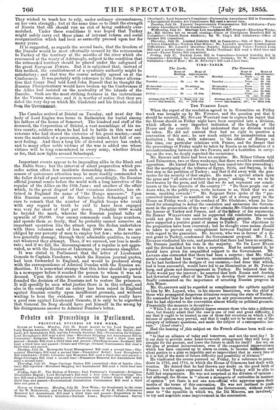Important events appear to be impending alike in the Black
and the Baltic Seas ; but the interval of silent preparation which pre- cedes action offers few incidents demanding notice. In such a season of quiescence attention may be more readily commanded to the fuller detail of past occurrences ; and, accordingly, the Russian official journal comes before the world with a long narrative of the repulse of the Allies on the 18th Jane ; and another of the affair which, to the great disgust of that veracious chronicle, has ob- tained in England the name of "the Hango massacre." Upon this Russian account of the failure before Sebastopol it oc- curs to remark that the number of English troops who could with any regard to truth be said to have been engaged was very far short of that put down. Probably 8000 would be beyond the mark, whereas the Russian journal talks of upwards of 20,000. Our enemy commands such large numbers, and spends them so freely, that he probably cannot conceive an important operation like the attack upon the Redan undertaken with three columns each of less than 2000 men. But we are obliged by our poverty of men to employ but few; who neverthe- less generally manage, through their admirable qualities, to carry out whatever they attempt. Thus, if we succeed, our loss is mode- rate ; and if we fail, the discouragement of a repulse is not aggra- vated, as with the Russians at Inkerman, by enormous slaughter. It was stated in Parliament that the letter of Lieutenant Geneste to Captain Fanshawe, which the Russian journal quotes, had been forwarded to England, and would be produced along with the correspondence of Admiral Dundas with the Russian au- thorities. It is somewhat strange that this letter should be quoted in a newspaper before it reached the person to whom it was ad- dressed. Upon the statements it contains has apparently been founded the decision of the Russians not to restore the prisoners. It will speedily be seen what justice there is in this refusal, and also in the complaint that an outcry has been raised in England against Russian cruelty upon insufficient grounds, and without waiting to hear the evidence. If our adversaries really have a good case against Lieutenant Geneste, it is only to be regretted that General De Berg should have put himself-in the wrong by his disingenuous answer to Admiral Dundas's letter.


























 Previous page
Previous page